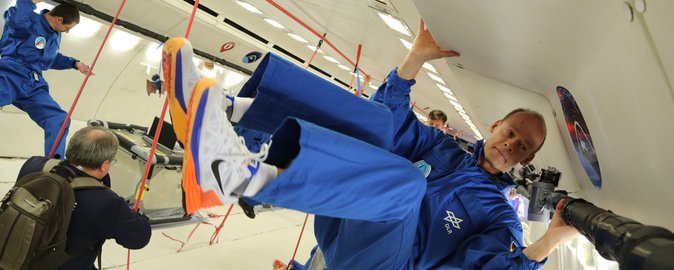- Education
-
Research
Current research
Talent
-
Collaboration
Businesses
Government agencies and institutions
Alumni
-
About AU
Organisation
Job at AU
Thomas Corydon from the Department of Biomedicine was recently flying high as both cancer cells and researcher were exposed to weightlessness. See his own recordings from his latest parabolic flight.
2014.12.02 |

Associate Professor Thomas Corydon in weightless conditions during his latest parabolic flight. Private photo.
At the beginning of November, Associate Professor Thomas Corydon boarded a purpose-built Airbus A300 aircraft to study how cancer cells react during weightlessness. Through the use of what are known as parabolic flights – where the aircraft climbs and descends steeply, weightlessness is achieved for 22 seconds at a time. During the flight the cancer cells were preserved with a chemical substance so that it was possible to subsequently examine how weightlessness affected the cells.
The parabolic flight is part of the research into space medicine being run by Professor Daniela Grimm from the Department of Biomedicine. Previous studies have shown that thirty per cent more cancer cells die in weightlessness compared to when they are under the effects of gravity. In the spring, the researchers sent cancer cells to the International Space Station ISS. In 2015 they will once again send cancer cells into space.
The hope is that in the long term the research can lead to new ways of treating cancer.
Associate Professor Thomas J. Corydon
Aarhus University, Department of Biomedicine
Direct tel: +45 8716 7775
Mobile: +45 2899 2179
corydon@biomed.au.dk